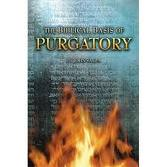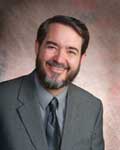I love talking with John Salza…tough doctrine and dogma that for most of us is difficult to explain, is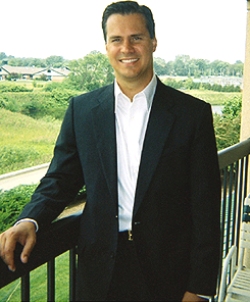 just so easy for John. And he shares his knowledge with all of us…what a gift!
just so easy for John. And he shares his knowledge with all of us…what a gift!
John’s website is www.scripturecatholic.com
[powerpress]
From the book description:
In The Biblical Basis for Purgatory, John  offers the definitive scriptural explanation of this distinctively Catholic doctrine. Building on the teachings of Christ and St. Paul, he shows how the existence of a place of temporal punishment after death is not only a logical extension of what we know about the reality of sin and God’s justice, but is also a supreme expression of God’s love and mercy. Although Purgatory is a place of mercy, its pains are real, and they are severe. This book does more than defend and explain Purgatory it provides a solid plan, drawn from the Church s perennial wisdom for conquering our sins by God s grace, while still on earth.
Tags: biblical basis, catholic, catholic podcast, catholic prayer, cathollc spirituality, john salza, purgatory
This entry was posted on Sunday, November 2nd, 2014 at 12:32 am
You can follow any responses to this entry through the RSS 2.0 feed.
Canon of Scripture
[powerpress]
On this Faith Check, let’s talk a little about how we got God’s Holy Word.
The early Christians relied on the Greek translation of the Old Testament, which is the version most often quoted in the New Testament and the one Jesus probably heard growing up. This version also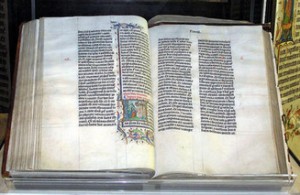 includes the books that Protestants call the “Apocrypha†and typically don’t include in their Bibles.
includes the books that Protestants call the “Apocrypha†and typically don’t include in their Bibles.
It took a while for the Catholic Church to compile the New Testament. Some books such as the 4 gospels were accepted by all, and others, such as the spurious gospels one hears about in The DaVinci Code were rejected by all. However, other books were completely orthodox but disputed, including some that weren’t ultimately included such as The Didache and others that were like Hebrews and Revelation.
The “canonâ€, which is the list of books that belong in the Bible, was determined primarily to say which books could and could not be read at the liturgy, and was largely settled by a series of Church councils approved by the Pope and bishops in the late 300s.1
Hence, when you trust in the inspiration of the Bible, you are trusting a Spirit-led decision of the Roman Catholic Church.
1 -Â Council of Rome under Pope St. Damasus I [A.D. 382], Council of Hippo [A.D. 393], Council of Carthage [A.D. 397],
Epistle of Pope St. Innocent I to Bishop Exuperius [A.D. 405]
Tags: canon of scripture, catholic apologetics, catholic church, Faith Check, New Testament, old testament, sacred scripture
This entry was posted on Thursday, October 31st, 2013 at 4:37 am
You can follow any responses to this entry through the RSS 2.0 feed.
The Place of the Bible in the Church
[powerpress]
You know, as Catholics we believe that the Bible is God’s Holy and Inspired Word.
However, we don’t hold that our Lord intended the Bible alone to be our sole teacher in the Christian faith.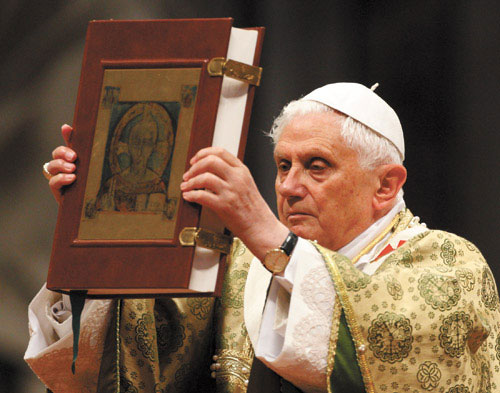
Just think how easily the meaning of our e-mails can be misinterpreted, sometimes causing great strife between people. Then take the Bible, which is infinitely longer, more complex, and written over a millennia ago in a world very different from our own, and we can begin to see why Jesus wouldn’t leave His teaching to just a book.
The Church looks to what it calls Sacred Tradition—which is rooted in things like Church Councils, Creeds, and the early Fathers of the Church—to safeguard our interpretation of God’s Word. All of the Catholic Church’s beliefs can be traced back to the earliest Christians.
Our Lord also chose the twelve apostles to go out and make disciples of all nations1 and promised them the assistance of the Holy Spirit.2 The apostles ordained bishops who have succeeded them down to this present day.3 The Catholic Church is a living voice that rings out for all to hear, proclaiming and interpreting God’s Word to every generation.4
1 -Â Mt. 28:20
2 -Â Jn. 14:26
3 -Â cf. Acts 14:23; 1 Tim. 3:1-8; 2 Tim. 1:6; 2:2; Tit. 1:5; Js. 5:14; 1 Pt. 5:1; Jd. 8ff
4 -Â cf. 1 Tim. 3:15; Mt. 16:18
Tags: bible, catholic apologetics, catholic church, Church, Faith Check, holy spirit
This entry was posted on Tuesday, October 15th, 2013 at 12:35 am
You can follow any responses to this entry through the RSS 2.0 feed.
Church Authority to Interpret the Bible
[powerpress]
Many say that the Bible alone is all we need to know God’s Truth. But just look at all of the questions that
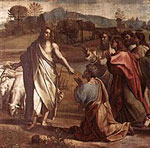 divide Christians today because of differing views over what the Bible teaches: Should infants be baptized?, can I lose my salvation?, or what about the many moral issues that we face?
divide Christians today because of differing views over what the Bible teaches: Should infants be baptized?, can I lose my salvation?, or what about the many moral issues that we face?
Our Lord said that a house divided cannot stand, and He never intended for His followers to interpret the Bible privately (2 Pet. 1:20). Jesus left us a visible Church whose leaders have authority to teach and govern God’s people.
In Matthew 18, Jesus said that insurmountable debates should be taken to the Church for resolution.1 For those that understand this and still refuse to listen to the Church, Jesus has a stern warning. Of course, to follow Jesus’ teaching on this necessarily requires a single Church that is organized and consistent.
For 2,000 years the Catholic Church has been fulfilling this role in order that the Body of Christ might experience the harmony of being truly unified in heart and mind. Small wonder St. Augustine said, “I would not believe in the Gospel myself if the authority of the Catholic Church did not influence me to do so.” 2
1 – Mt. 18:15-18
2 – Against the letter of Mani, 5,6, 397 A.D.
Tags: catholic apologetics, catholic church, Church, church authority, Faith Check, heart, Jesus
This entry was posted on Monday, September 9th, 2013 at 6:54 am
You can follow any responses to this entry through the RSS 2.0 feed.
What a delight to be joined once again by Dr. Scott Hahn to share in a conversation about the delicious meal contained in our Sacred 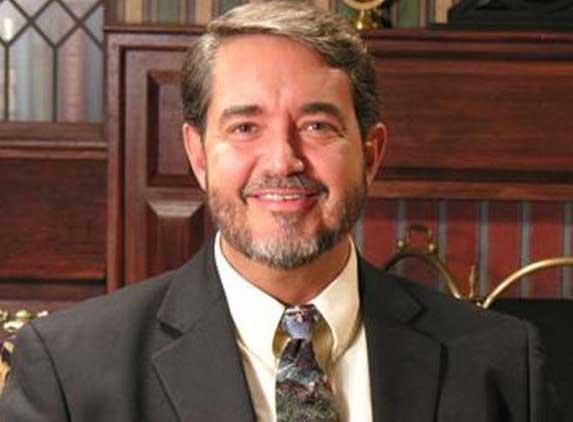 Scriptures. In “Consuming the Word: The New Testament and the Eucharist in the Early Church”, Dr. Hahn helps us to make an important paradigm shift in our contemplation of the Word of God. Not just words transmitted in the pages of a book,  The Word  is meant to be seen as an action of Love. That action is best related in the gift of the Eucharist. Blessed John Paul II asked Catholics to “base the New Evangelization on the Eucharist”. As Catholics, we know Christ as the Eucharistic Lord and that is how the early Church proclaimed him. Dr Hahn reminds us that in the early Church there was no book that could be called the “New Testament”. That phrase was used to describe the Mass. Dr. Hahn will also go on to  warn us of the dangers found in  “intellectualizing the Bible, by recalling for us what St. Paul has said, “Knowledge puffs up, love builds up… It’s not love instead of knowledge, but knowledge ordered to love, because you can’t love what you do not know, but you can know and not love”. What an outstanding book, yet again, brought to us by Dr.Scott Hahn!
Scriptures. In “Consuming the Word: The New Testament and the Eucharist in the Early Church”, Dr. Hahn helps us to make an important paradigm shift in our contemplation of the Word of God. Not just words transmitted in the pages of a book,  The Word  is meant to be seen as an action of Love. That action is best related in the gift of the Eucharist. Blessed John Paul II asked Catholics to “base the New Evangelization on the Eucharist”. As Catholics, we know Christ as the Eucharistic Lord and that is how the early Church proclaimed him. Dr Hahn reminds us that in the early Church there was no book that could be called the “New Testament”. That phrase was used to describe the Mass. Dr. Hahn will also go on to  warn us of the dangers found in  “intellectualizing the Bible, by recalling for us what St. Paul has said, “Knowledge puffs up, love builds up… It’s not love instead of knowledge, but knowledge ordered to love, because you can’t love what you do not know, but you can know and not love”. What an outstanding book, yet again, brought to us by Dr.Scott Hahn!
[powerpress]
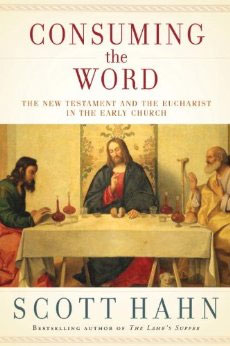 You can find the book here
You can find the book here
“Scott Hahn has a well-earned reputation as a vivid guide to the Word of God. That skill is elegantly on display here. Consuming the Word is erudite and accessible, rich in content and lucid in style — an engaging read for anyone who seeks to better understand the profound interplay of Scripture, Liturgy and the role of the Church in Christian life.” Most Reverend Charles J. Chaput, O.F.M. Cap., Archbishop of Philadelphia
“With words that are both accessible and erudite, Dr. Scott Hahn introduces us anew to the Eternal Word of the New Testament, a word that is given to us, not simply as a text in a book, but as the living and real presence of the Lord Jesus himself.” Very Reverend Robert Barron, author of Catholicism: A Journey to the Heart of the Faith
Tags: catholic, catholic podcast, catholic prayer
This entry was posted on Saturday, June 1st, 2013 at 8:07 am
You can follow any responses to this entry through the RSS 2.0 feed.
“The Will of God: Finding and Fulfilling Your Purpose in Life” is a great book which uses the great Psalm 119 to help us in the 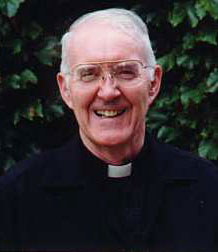 area of discernment.  Taking a lifetime of steeped  in prayer and sound theology, Fr. Baker gives us a unique and penetrating resource to aid in our growth in the areas of contemplation and discernment. Father Baker was the editor of Homiletic & Pastoral Review for more than 40 years, and currently serves as Editor Emeritus of the online edition.  He was a joy to talk with and to learn from….not to be missed for the discerning heart!
area of discernment.  Taking a lifetime of steeped  in prayer and sound theology, Fr. Baker gives us a unique and penetrating resource to aid in our growth in the areas of contemplation and discernment. Father Baker was the editor of Homiletic & Pastoral Review for more than 40 years, and currently serves as Editor Emeritus of the online edition.  He was a joy to talk with and to learn from….not to be missed for the discerning heart!
[powerpress]
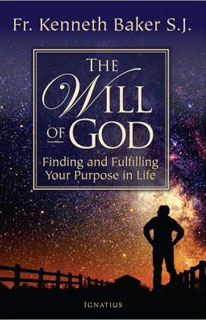 You can find the book here
You can find the book here
“Father Baker helps us to discover God’s will and, what is even more, important how to live God’s will! He uses the Holy Scriptures,the teaching of the Church and the saints to help us become holy and transformed into the saints that God created us to be. Read this book and discover what God wants you to do!” —Fr. Larry Richards, Author, Be a Man!
Tags: catholic, catholic podcast, catholic prayer
This entry was posted on Friday, May 24th, 2013 at 5:15 pm
You can follow any responses to this entry through the RSS 2.0 feed.
With “Seeking Truth” founder and teaching director, Sharon Doran, we take a critical look at the History Channel presentation of “The Bible”, produced by Roma Downey and Mark Burnett.  While we appreciate the opportunity to have the Bible lifted up in such a way on cable television, this presentation, and in particular the episode entitled “The Mission”, contains some problematic elements which subtly challenge basic tenets of our Catholic Christian understanding of the Gospel.  The argument has been made that artistic license needed to be employed to present the scope of the Bible in 10 hours, however certain choices were made by it’s producers which could be questioned by the discerning heart.  Also, several prominent Catholic leaders have encouraged the viewing of this presentation.  Should we being viewing it as a means of Evangelization or as simply a piece of entertainment?  Is there a danger in using this as tool in Catholic catechesis?  With Sharon, along with our Bibles in hand, we address some these questions and take a deeper look at some of the more challenging depictions presented in “The Mission” episode.
Mark Burnett.  While we appreciate the opportunity to have the Bible lifted up in such a way on cable television, this presentation, and in particular the episode entitled “The Mission”, contains some problematic elements which subtly challenge basic tenets of our Catholic Christian understanding of the Gospel.  The argument has been made that artistic license needed to be employed to present the scope of the Bible in 10 hours, however certain choices were made by it’s producers which could be questioned by the discerning heart.  Also, several prominent Catholic leaders have encouraged the viewing of this presentation.  Should we being viewing it as a means of Evangelization or as simply a piece of entertainment?  Is there a danger in using this as tool in Catholic catechesis?  With Sharon, along with our Bibles in hand, we address some these questions and take a deeper look at some of the more challenging depictions presented in “The Mission” episode.
[powerpress]
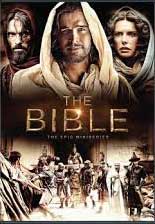
For solid teachings on the Sacred Scripture, we encourage you to check out  “Seeking Truth†which is an in depth Catholic Bible Study, commissioned by the Archdiocese of Omaha in response to John Paul II’s call to the New Evangelization as well as Pope Benedict XVI’s exhortation for all Catholics to study scripture. To learn more go to:www.seekingtruth.net
“Seeking Truth†which is an in depth Catholic Bible Study, commissioned by the Archdiocese of Omaha in response to John Paul II’s call to the New Evangelization as well as Pope Benedict XVI’s exhortation for all Catholics to study scripture. To learn more go to:www.seekingtruth.net
Tags: Catholic Christian, discerning heart, History Channel, Sharon Doran
This entry was posted on Friday, March 29th, 2013 at 7:29 am
You can follow any responses to this entry through the RSS 2.0 feed.
This is such an interesting conversation Bruce and I had with author John Salza! Â We discussed this time around, “The Biblical Basis for the Papacy”. Â Fascinating.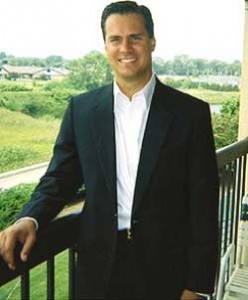
[powerpress]
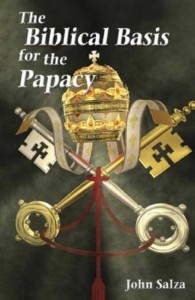 You can purchase the book here
You can purchase the book here
From the book description:
The Roman Catholic Papacy is the longest-living institution in the Western World – and at times one of the most controversial due to the basic doctrines of: Papal Authority, Papal Infallibility and Apostolic Succession. Drawing upon Old and New Testament Scripture, Tradition, and the words of the Early Church Fathers, author and noted Catholic apologist John Salza presents a comprehensive and compelling story of the office of the papacy from a biblical perspective. Arguments against the papacy are weighed and refuted in a charitable but convincing manner, making this a valuable resource for everyone intrigued or confused by the nearly 2,000 year old papal office – regardless of your faith background. Whether you are defending, questioning or exploring the Catholic Faith, this book provides the most concise and clear examination of the Catholic Church’s supreme teaching office as instituted by Christ, Our Lord and Savior.
Tags: catholic church, early church fathers, john salza, papacy
This entry was posted on Sunday, March 3rd, 2013 at 3:37 pm
You can follow any responses to this entry through the RSS 2.0 feed.
[powerpress] Well we simply can’t say that studying the Old Testament is intimidating anymore, not when there is the work of Dr. John  Bergsma to help us through the door. “Bible Basics for Catholics: A New Picture of Salvation History” is a wonderful guide to begin the journey, not only for the individual, but also for the entire family.  Many of us our visual learners, and bearing that in mind, Dr. Bergsma has transformed what has worked for his classroom into a book that can help us all.  It is indeed a unique approach, which seems like a simple presentation, but is so packed with important fundamental elements of Sacred Scripture that you hardly realize that you’ve mastered the “heavy” things.  Instead you come away more aware and deeply appreciative of the “family” history in which we’ve been given. His love for the Old Testament is apparent, and he passes on new insights to us all.  Having been twice voted Faculty of the Year by graduating classes at Franciscan University, he is a popular teacher whose love of scripture inspires his students….and now we can see why!
Bergsma to help us through the door. “Bible Basics for Catholics: A New Picture of Salvation History” is a wonderful guide to begin the journey, not only for the individual, but also for the entire family.  Many of us our visual learners, and bearing that in mind, Dr. Bergsma has transformed what has worked for his classroom into a book that can help us all.  It is indeed a unique approach, which seems like a simple presentation, but is so packed with important fundamental elements of Sacred Scripture that you hardly realize that you’ve mastered the “heavy” things.  Instead you come away more aware and deeply appreciative of the “family” history in which we’ve been given. His love for the Old Testament is apparent, and he passes on new insights to us all.  Having been twice voted Faculty of the Year by graduating classes at Franciscan University, he is a popular teacher whose love of scripture inspires his students….and now we can see why!
Be sure to visit the fantastic “The Sacred Page” blog he shares with Brant Pitre, and Michael Barber (what a trio!)
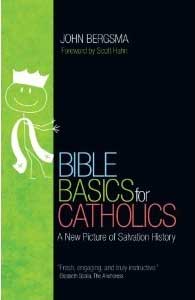 You can find the book here
You can find the book here
“John Bergsma is a very effective teacher of Scripture with a gift for clarity and depth.” —Scott Hahn, Author of Signs of Life: 40 Catholic Customs and Their Biblical Roots
“John Bergsma brings his biblical scholarship, pastoral heart, and gift for teaching together in this charming, easy-to-use overview of Salvation History. Catechists, teachers, and pastoral ministers will find this an inestimable resource, both for their own reference, and for shepherding those under their care. Highly recommended.” —Edward Sri, STD, Chancellor and Professor of Scripture and Theology, Augustine Institute
“We go by way of history and imagination to the Holy Land, and to times long past, and we meet the most fascinating people who ever lived: Abraham, Moses, David, Jesus. We can do all this because of John Bergsma’s rare gifts. This book can change lives.” —Mike Aquilina, Author of The Mass: The Glory, the Mystery, the Tradition
Tags: ave maria press, Edward Sri, franciscan university of steubenville, mike aquilina, old testament, scott hahn, STD
This entry was posted on Friday, August 10th, 2012 at 1:50 pm
You can follow any responses to this entry through the RSS 2.0 feed.
[powerpress = “Vatican_Radio”]
It was the 18th of November 1965 and in Saint Peter’s Basilica the Second Vatican Council was drawing to a close when
during its penultimate session Pope Paul VI promulgated the Dogmatic Constitution on Divine Revelation.
At the time of this ground breaking Council, a young Patrick Kelly now Archbishop of Liverpool was present in Saint Peter’s Basilica witnessing on many an occasion the discussions of the Council Fathers. He shared with Veronica Scarisbrick his memories of that epoch and in a special way of that document on Revelation, gone down in history with the Latin title of ‘Dei Verbum’
Fifty years on from the beginning of that Council back on the 11th of October 1962 , among the events to mark this anniversary is a conference taking place here in Rome on April 26th sponsored by the Pontifical Lateran University and focusing on this same ‘Dei Verbum’ document.
The man to chair this meeting is the Dean of the Faculty of Church History and Fine Arts of the Church at the Pontifical Gregorian University, Jesuit Professor Norman Tanner.In an effort to find out more about ‘Dei Verbum’ Veronica Scarisbrick went round to call on him at the University there and began by asking him how important this document was at the time it was drawn up.
While acknowledging its central role Father Tanner also places it in the broader context of the Council documents and then goes on to highlight the relevance of this document today.
Tags: catholic, catholic podcast, catholic prayer, cathollc spirituality, Council Fathers, Second Vatican Council, vatican radio, Veronica Scarisbrick
This entry was posted on Thursday, April 26th, 2012 at 11:40 am
You can follow any responses to this entry through the RSS 2.0 feed.
Tags: catholic, catholic podcast, catholic prayer, cathollc spirituality, scott hahn, st. paul center for biblical theology
This entry was posted on Thursday, January 5th, 2012 at 7:47 am
You can follow any responses to this entry through the RSS 2.0 feed.
Tags: catholic, catholic podcast, catholic prayer, cathollc spirituality, scott hahn, st. paul center for biblical theology
This entry was posted on Thursday, January 5th, 2012 at 7:44 am
You can follow any responses to this entry through the RSS 2.0 feed.
Tags: catholic, catholic podcast, catholic prayer, cathollc spirituality, scott hahn, st. paul center for biblical theology
This entry was posted on Thursday, January 5th, 2012 at 7:38 am
You can follow any responses to this entry through the RSS 2.0 feed.
Tags: catholic, catholic podcast, catholic prayer, cathollc spirituality, scott hahn, st. paul center for biblical theology
This entry was posted on Thursday, January 5th, 2012 at 7:29 am
You can follow any responses to this entry through the RSS 2.0 feed.
Tags: catholic, catholic podcast, catholic prayer, cathollc spirituality
This entry was posted on Thursday, January 5th, 2012 at 7:23 am
You can follow any responses to this entry through the RSS 2.0 feed.

